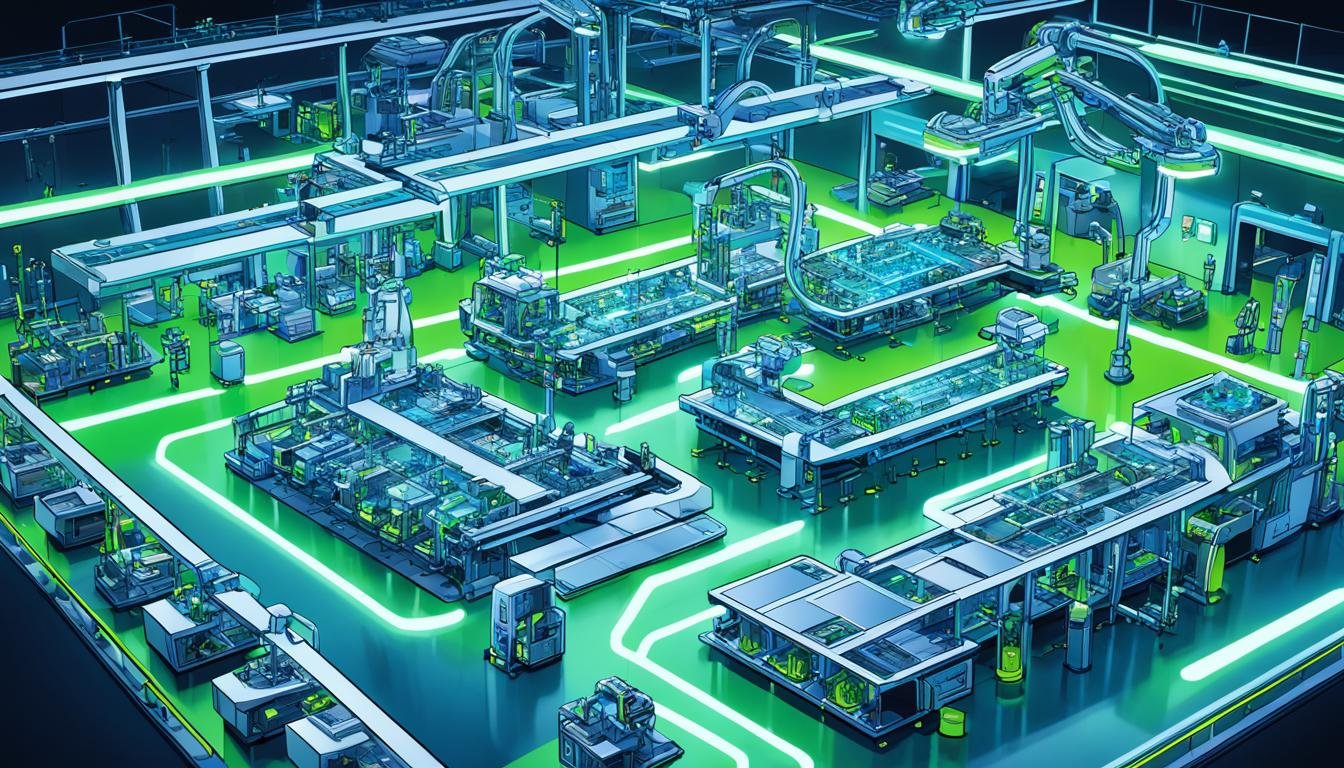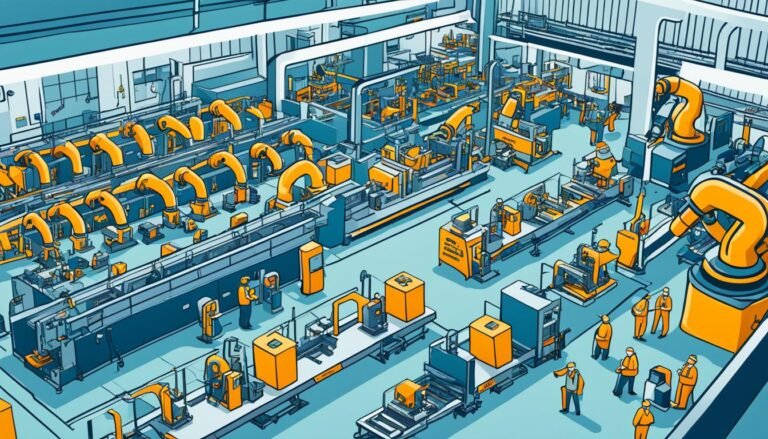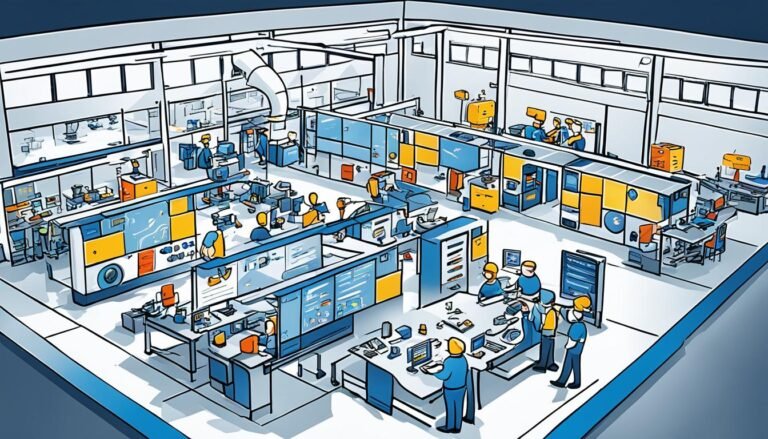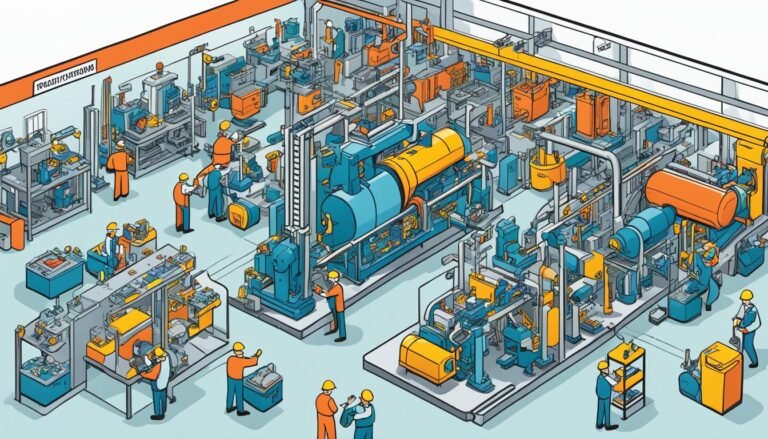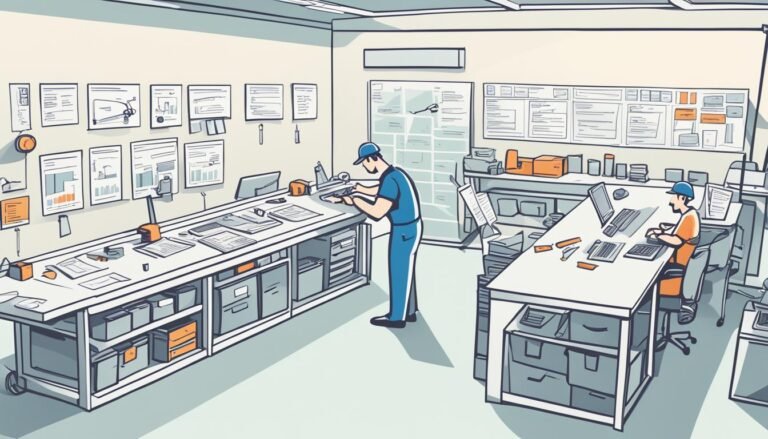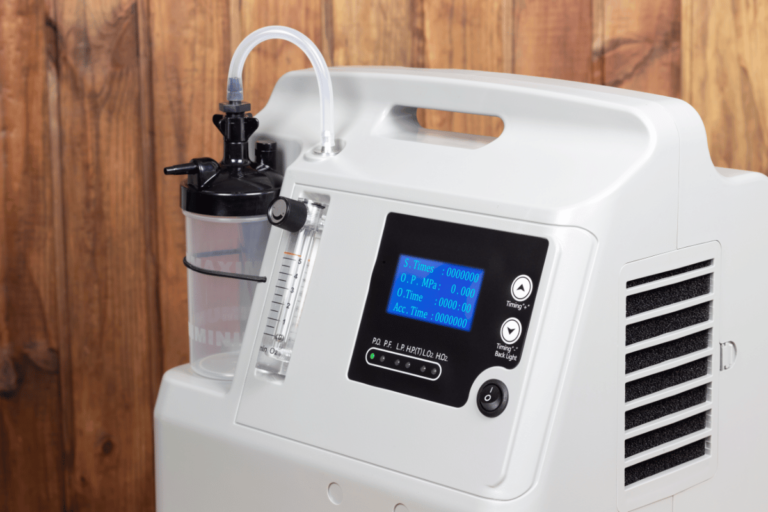Electronics Manufacturing: Powering Innovation
Did you know the global electronics market is set to hit nearly $600 billion by 2027? This shows how important electronics manufacturing is for tech progress in many fields. From smartphones to medical devices, our daily innovations depend on electronics manufacturing’s strength.
At the core, advanced ERP solutions like Deskera play a big part. They make production planning smoother and boost efficiency. Deskera uses live analytics for managing complex Bills of Materials and inventory. This ensures smooth supply chain operations.
These tools match production with market needs and tackle complex operations. They also help maintain top-notch product quality.
Thanks to Industry 4.0 tech like IoT, AI, and data analytics, smart manufacturing is now common. Deskera’s ERP solutions show how the right tech can fuel innovation. This makes electronics manufacturing more adaptable, efficient, and green.
Key Takeaways
- The electronics manufacturing market is expected to reach nearly $600 billion by 2027.
- Deskera’s ERP solutions enhance production planning and operational efficiency.
- Live analytics and inventory control are crucial for seamless supply chain operations.
- Integration of IoT, AI, and data analytics is driving smart manufacturing.
- Electronics manufacturing is essential for technological advancements in various industries.
The Role of Silicon Wafer Manufacturing in Innovation
Silicon wafer technology is key in many industries, leading to new ideas and changes. It’s vital in fields like telecommunications, healthcare, renewable energy, and consumer electronics.
Telecommunications Advancements
Advances in silicon wafer tech have boosted the telecom industry. These wafers help make faster data transfer and reliable communication possible. They’ve made 5G networks and satellite comms a reality.
Impact on Healthcare Technologies
In healthcare, silicon wafers have led to smaller sensors for monitoring patients in real-time. This tech is crucial for wearables and implantable devices. It helps in giving patients better care.
Driving Renewable Energy Solutions
Silicon wafer tech is key for sustainable energy. It helps make solar cells more efficient, making clean energy cheaper. This speeds up the switch to green energy, helping the planet.
Applications in the Automotive Industry
In cars, silicon wafers are changing the game. They improve driver aids and electric car parts. This tech means cars are safer, more efficient, and more advanced.
Consumer Electronics Revolution
Consumer tech is booming thanks to silicon wafers. These chips make devices smaller yet more powerful. From phones to smart home devices, this tech brings new features and better experiences.
| Industry | Advancements Enabled by Silicon Wafer Technology |
|---|---|
| Telecommunications | Enhanced connectivity, 5G networks, satellite communications |
| Healthcare | Miniaturized sensors, real-time monitoring, personalized medical solutions |
| Renewable Energy | High-efficiency solar cells, accessible and cost-effective clean energy |
| Automotive | Driver-assistance systems, electric vehicle components, improved performance and safety |
| Consumer Electronics | Smaller, more powerful devices, enhanced user experiences |
Leveraging Industry 4.0 for Enhanced Electronics Manufacturing
Industry 4.0 is changing how we make electronics, making things faster and smarter. It uses new tech like IoT, AI, and automation to change old ways of making things.
Integration of IoT and AI
Using IoT and AI in electronics factories helps them work better. IoT devices send lots of data from different parts of production. AI then uses this data to make smart choices.
This helps factories make better decisions, work more efficiently, and know when they need maintenance. This means less time stopped and more making products.
Boosting Efficiency Through Automation Systems
Automation is key in making electronics today. It takes over simple and boring tasks, making factories work better and more accurately. Automation cuts costs and makes sure things get done on time.
This lets factories focus on new ideas and growing, seeing automation as a big part of Industry 4.0.
Data Analytics for Quality Control
Data analytics is very important for checking quality. Tools like those from Deskera help factories keep a close watch on their work. These tools spot problems early, meet safety rules, and make products better.
Industry 4.0’s focus on data analytics means quality checks get smarter and more efficient. This helps make manufacturing smarter and better.
Optimization of Supply Chain and Inventory in Electronics Manufacturing
Getting the supply chain right in electronics is key to staying ahead. Using the latest tech helps with managing stock, making warehousing smooth, and keeping things running well.
Leveraging an electronics supply chain platform can integrate these functions seamlessly, enhancing visibility and coordination across the entire supply chain.
Real-Time Visibility in Inventory Management
Seeing what’s happening in real-time is crucial for managing stock well. Tools like Deskera’s software help manage stock across different places. This lets makers keep track of stock, guess demand, and cut down on waste.
Efficient Warehousing and Logistics
How things move in and out of warehouses is important in making electronics. By linking stock management with warehousing, makers can keep things running smoothly. This also helps spot and fix problems early on.
Supply Chain Optimization Techniques
Using smart ways to optimize the supply chain is key to doing well. Methods like just-in-time stock, smart buying, and predicting demand help match supply chain steps with making things lean. This makes sure resources are used well and keeps costs down, making things more productive and profitable.
| Optimization Technique | Benefits |
|---|---|
| Just-in-Time Inventory | Reduces carrying costs and minimizes waste |
| Strategic Sourcing | Ensures reliable supply and cost savings |
| Demand Forecasting | Improves planning and reduces stockouts |
Emerging Trends in Semiconductor Fabrication
Recent trends in semiconductor fabrication show a big leap forward. New technologies are coming together fast to meet the needs of today’s electronics.
Advancements in Solid-State Battery Technologies
Solid-state battery technology has made big strides, especially with the use of high-purity lithium sulfide. This breakthrough means batteries can be safer, last longer, and work better. These batteries are key for making wearable devices last longer and stay safe.
Also, new electrode materials are making solid-state batteries better. These materials increase how much energy the batteries can hold and make them charge faster. This makes solid-state batteries a top choice for the next generation of devices.
Innovations in Circuit Boards
In semiconductor fabrication, circuit boards have seen big changes. New fire protection solutions and materials like lithium carbonate are key to making boards that can handle heat and last longer.
These innovations in circuit boards make devices more reliable and long-lasting. They affect everything from consumer gadgets to cars and industrial tools. These new materials help devices meet high safety and performance standards, keeping them working even in tough conditions.
The mix of semiconductor fabrication, solid-state battery tech, and circuit board innovations is shaping the future of electronics. We’re moving towards safer, more efficient, and reliable devices.
Conclusion
The world of making electronics is always changing, thanks to new tech and digital breakthroughs. Silicon wafers play a big part in improving things like our phones and health tech. The growth of the electronics industry is huge.
Using Industry 4.0 has shown how important it is to mix IoT, AI, and automation in making electronics. This mix makes things work better and improves quality by using data smartly. These smart ways of making things are key to making the industry more productive and precise.
New trends in making semiconductors, like better batteries and circuit boards, show how the industry keeps getting better. These new techs open up new ways to connect the world, changing our digital lives. As electronics making keeps evolving, it will keep being a big part of global innovation.

